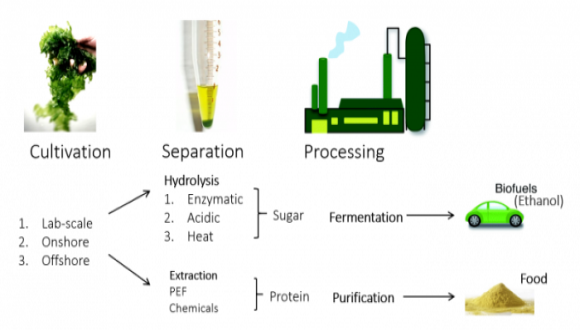Development of algae-bacteria symbiosis to generate energy and food
Innovative studies conducted at the Environmental Bio-engineering Lab at the Department of Environmental Studies
Researchers and students at the Environmental Bio-engineering Laboratory, led by Prof. Alex Golberg, conduct studies to develop sustainable industrial production processes for the manufacturing of biofuel, bioplastics and food from seawater algae. These studies are designed to pave the way for the production of ethanol - biofuel, sugars and proteins thanks to seaweed and bacteria living in seawater. This would allow the establishment of algae farms for sustainable production.
The future goals of the seaweed research developments are to become industrial scale applications, yet at present, the research is at a laboratory-scale with initial algae farms created for offshore experiements.
At a recent weekly seminar meeting of the Department of Environmental Studies, PhD candidate Mark Polikovski presented two studies conducted under the guidance of Prof. Alex Golberg and Prof. Uri Gopna for the development of algae-bacteria symbiosis to enable sustainable energy and food production and for a study of the potential risk of allergic reaction to proteins extracted from Ulva algae. These research studies can leed to optimize new sustainable production processes of food and biodegredable fuel that will provide much needed solutions for a growing global population.
Rima Ganaim and Meiron Zollmann have also won research grants and published research papers about the use of macro-algae as an innovative biological source for fuel.
Another study explored the developing of bioplastic polymers from algae, thanks to a process that combines the ubiquitous Ulva seaweed and Haloferax Mediterranei microorganisms, which also grow in salt water. The developed process has the potential for industrial production of biopolymers that would be an alternative to the use of plastic.
The currently industrial production of bio-plastics requires the use of agricultural land and fresh water. The process developed in the Environmental Bio-engineering Laboratory is a significant breakthrough as it can be carried out in seawater and save the use of agricultural land and potable water. It could also enable countries suffering from freshwater scarcity to produce sustainable biodegradable plastics. The production process will therefore be efficient, economical and environmentally friendly.
The researchers have published articles of their discoveries in the scientific literature such as this paper in the January 2019 issue of Bioresource Technology. You can find other manuscripts and publications on this page.


